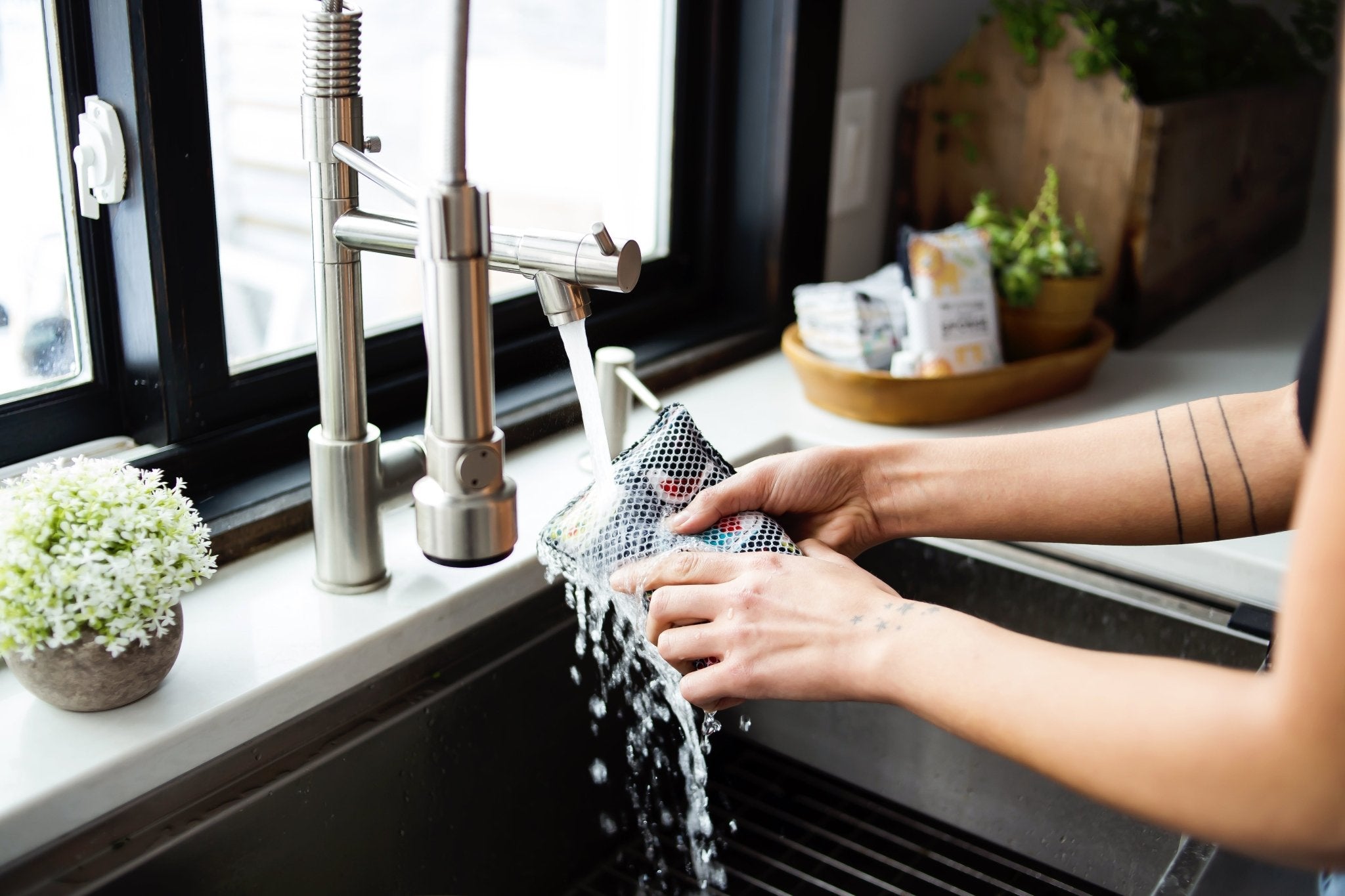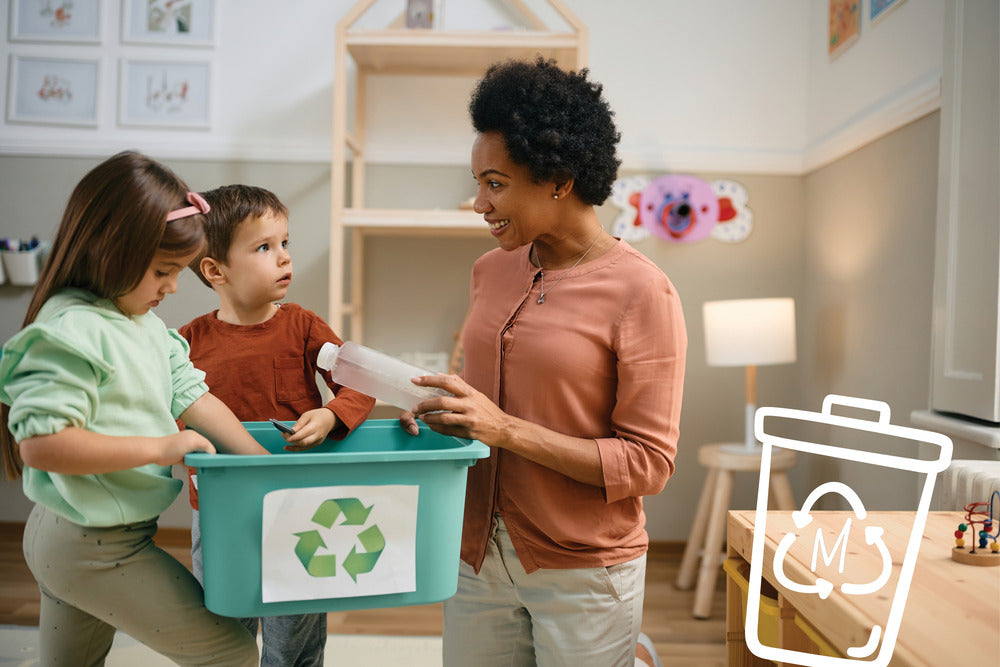Just like doing laundry, doing dishes is a weekly, or even daily task in many households. It’s something we just have to do, but what a great opportunity to find new ways to practice sustainability! From plastic sponges, to water waste, doing dishes isn’t always the most eco friendly, so we have rounded up some tips, tricks, and products that can help make your time in the kitchen more sustainable.

1. Watch How You Wash
It can be easy to use gallons of water before we even realize it, especially when hand washing. However, we don’t all have access to a dishwasher, so when hand washing try to use cool water and turn off the faucet as much as you can to watch your water usage. If you use a dishwasher, only run full loads at a lower temperature setting, and try to air dry dishes as much as possible. Also, try your hand at composting food scraps instead of tossing them in the trash.

2. Use Sustainable Cleaning Products
Many traditional cleaning products are designed for single use, or like kitchen sponges, they contain microplastics which inevitably end up in landfills. Make the swap to a Washable Sponge, the reusable alternative to traditional kitchen sponges.We suggest keeping a few on hand so you always have one available while you rotate them through the wash. They are plastic free and washable, just throw them in the dishwasher or laundry when it's ready for a deep clean of its own. A Scrap Felt Dish Cloth is another option for sustainable cleaning. Handmade out of fabric scraps, each Scrap Felt Dish Cloth is unique, totally upcycled, and super versatile. This truly multi-purpose cloth acts similar to a Swedish Dish Cloth, but you can wash and dry with your normal laundry, and it won't break down like cellulose. It’s perfect for absorbing spills, polishing silver or scrubbing counters! We also offer a smaller, slightly different version of this called a Scrap Felt and Burlap Scrubber. We back this with rugged burlap from upcycled coffee bags to create a handy, zero waste scrubby that is great for tough stains or scrubbing pots and pans. Or, try Coir Brushes, another plastic free alternative for cleaning. Coir is a fiber made from the outer husk of a coconut, and the bristles are very stiff and long lasting.

3. Think About Your Soap Choices
A lot of dishwasher detergent or soaps contain harsh chemicals that are bad for your skin and the environment. Plus, things are usually packaged in plastic. When handwashing, try a Vegan Dish Washing Block. This zero-waste dish washing block is made by No-Tox Life in Los Angeles, California. It is a cleaning powerhouse with a rich, sudsy lather, and cuts stubborn grime and grease, without drying out your hands. You can use it for cleaning-duty all over your home! Take stains out of laundry, take labels off of jars, spot clean your carpet, or use it to wipe down counters. It's a truly multipurpose product.
For a dishwasher, we offer a few selections of dishwashing powder. For example, try Mama Suds Automatic Dishwashing Powder. It is made with safe ingredients, plus it's vegan, eco-friendly, 100% biodegradable, and comes packaged in a resealable and compostable bag. We also offer a very simple and safe Dishwashing Powder from Lovett Sundries, based in Pittsburgh, Pennsylvania. The main ingredients are washing soda and borax. Both are naturally occurring minerals harvested here in the U.S.A.!

4. Maintain Your Reusables
One of the key aspects of sustainability is incorporating reusables into your life. But this also means you need to care for and maintain your reusable items. If you cook with a cast iron skillet frequently, then consider using Cast Iron Conditioner from Lovett Sundries. This hardworking scrub makes it incredibly easy to clean and condition your cookware with every use. Just use this blend of oils with sturdy sea salt and you’ll be amazed at how slick and non-stick your pots and pans become. Use one spoonful to scrub your cookware clean. The process is easy. Rinse out salt and oil with warm water (no soap!), then put cookware on the stove and begin heating. Wipe out all remaining oil and water. When the cookware begins to smoke, remove it from heat and let it cool.
One common material in sustainable swaps is bamboo, but for longevity, it needs some love every now and then. Care for your wooden and bamboo reusables with Bamboo and Wood Finishing Oil. It is handcrafted in small batches with the highest quality, all-natural ingredients from sustainable resources. This bamboo and wood cutting board oil is made from a proprietary blend of Special Aged Linseed Oil, Pure Tung Oil, and Pure Beeswax. This blend is made without the use of GMO ingredients, toxic heavy metal dryers, chemical processing, petroleum distillates or bleaching. This product is biodegradable, non-ozone depleting and safe for the people applying it. Great for all types of wood and bamboo grains, this bamboo cutting board oil is easy to use and will keep your products looking new for years to come.
So, even though dishes and kitchen clean up are unavoidable, that doesn’t mean it has to be unsustainable. Whether you’re handwashing, dishwashing, or simply wiping down countertops after a meal, there are plenty of reusable and sustainable swaps to make. How else do you practice sustainability in the kitchen? Let us know, we’d love to talk!



